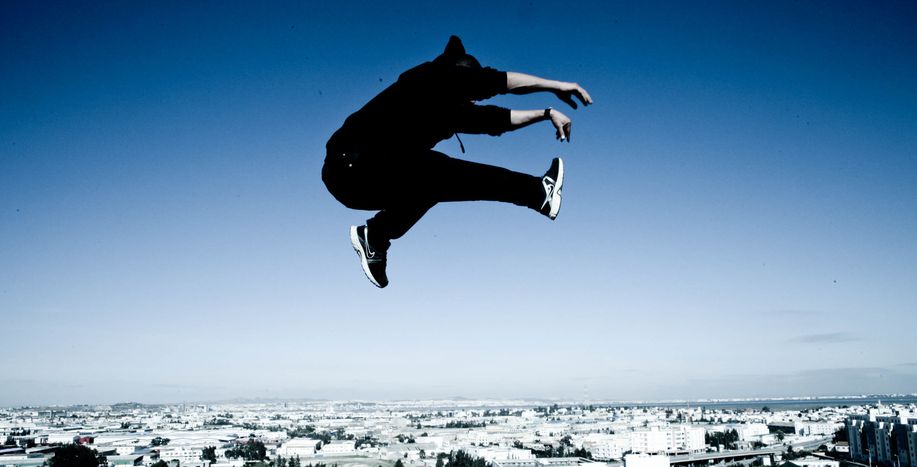
Free Running In Tunisia: Parkour is a lifestyle
Published on
Translation by:
Garen Gent-RandallIn the centre of Tunis and on its outskirts, urban spaces have recently become a playground for the young people who practise the art of getting around: parkour. Cafébabel spent five days with Hichem Naami, parkour master and founder of the Tunisan Freemove association. This is a photo story about the Tunisians whose dancefloor is the city itself
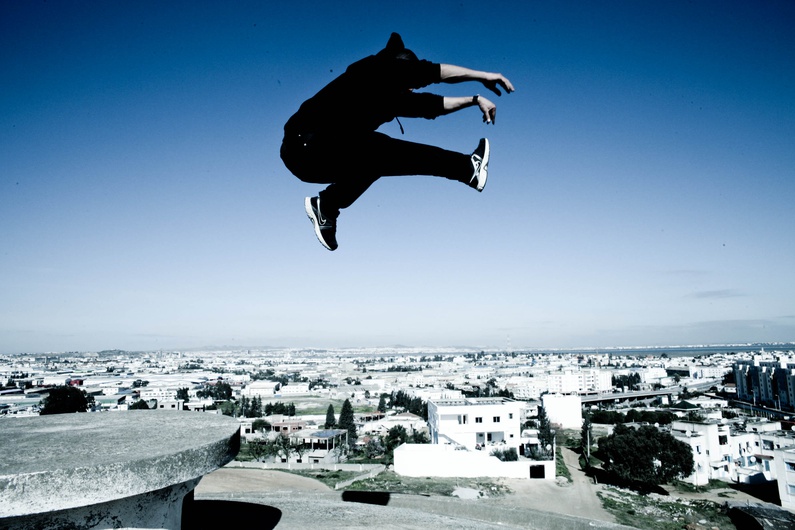 Hichem Naami, the leader of the Tunisian Freemove association, often practises just a few steps away from his house. Like here, on top of the water tower in the New Medina. Climbing barehanded and with no safety harness in case he falls, Hichem explains his risk-taking with a simple idea: "Above anything else, I want to be free in my movements, free in body and spirit."
Hichem Naami, the leader of the Tunisian Freemove association, often practises just a few steps away from his house. Like here, on top of the water tower in the New Medina. Climbing barehanded and with no safety harness in case he falls, Hichem explains his risk-taking with a simple idea: "Above anything else, I want to be free in my movements, free in body and spirit."
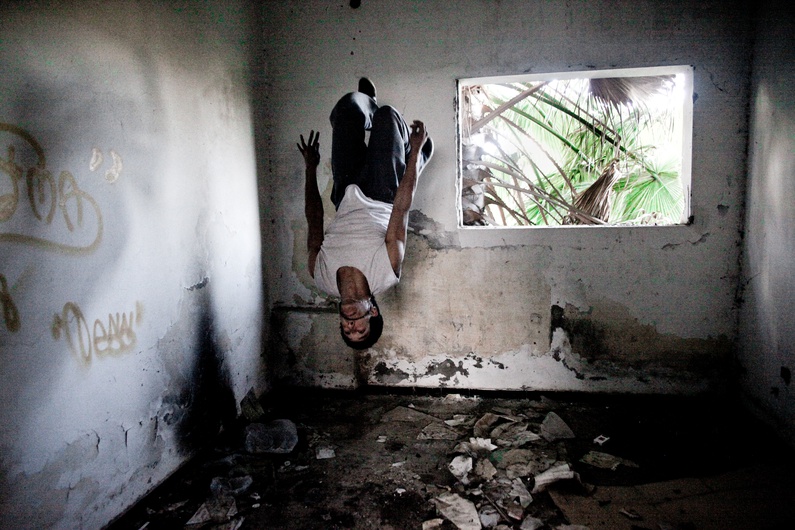 A few minutes from the centre of Tunis, disused buildings have become a playground for young freerunners. Shàrléz Màrwin, a member of the National School of Circus Arts in Tunis, doesn't hesitate for a second to throw himself in, no matter where. "You have to think of the obstacle as something useful, which helps you to get around and never prevents you from doing something."
A few minutes from the centre of Tunis, disused buildings have become a playground for young freerunners. Shàrléz Màrwin, a member of the National School of Circus Arts in Tunis, doesn't hesitate for a second to throw himself in, no matter where. "You have to think of the obstacle as something useful, which helps you to get around and never prevents you from doing something."
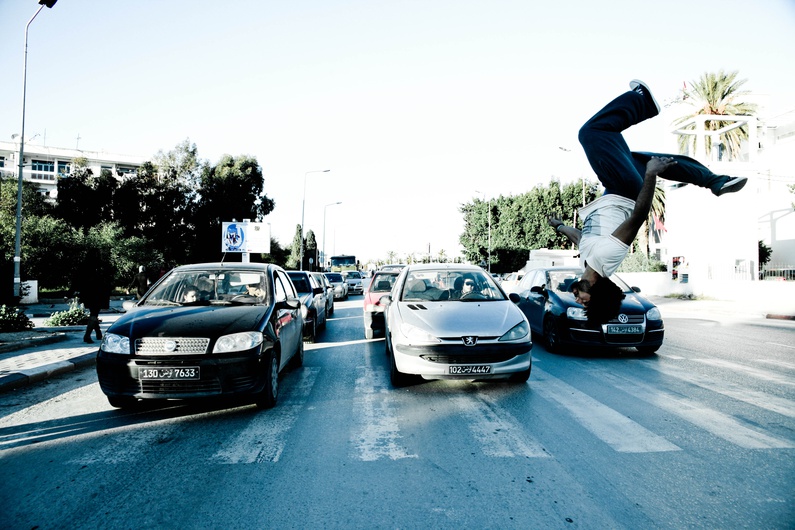 Parkour is "dancing with the obstacle to build a pure relationship between the person and the environment, without destroying what's around us and without getting hurt." El Menzah, in north Tunis. You just can't get from one place to another without taking advantage of every second and every plot of land to practise with.
Parkour is "dancing with the obstacle to build a pure relationship between the person and the environment, without destroying what's around us and without getting hurt." El Menzah, in north Tunis. You just can't get from one place to another without taking advantage of every second and every plot of land to practise with.
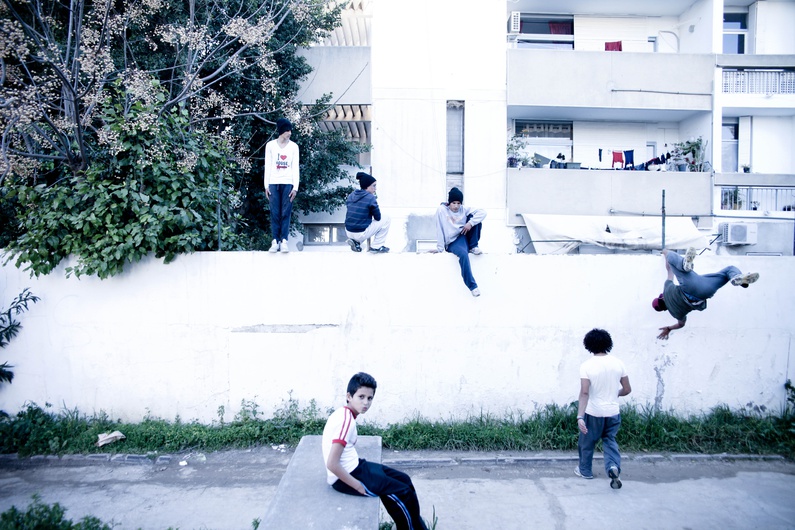 Members of the Tunisian Freemove association practise in Mutuelleville, in the El Menzah area of the city. "For a lot of young people who lean towards some kind of deviation from the norm, the act of finding the association gives them another source of pleasure and satisfaction. It gives them boundaries. The events organised by the association have an important role to play, they give the feeling of belonging to a community."
Members of the Tunisian Freemove association practise in Mutuelleville, in the El Menzah area of the city. "For a lot of young people who lean towards some kind of deviation from the norm, the act of finding the association gives them another source of pleasure and satisfaction. It gives them boundaries. The events organised by the association have an important role to play, they give the feeling of belonging to a community."
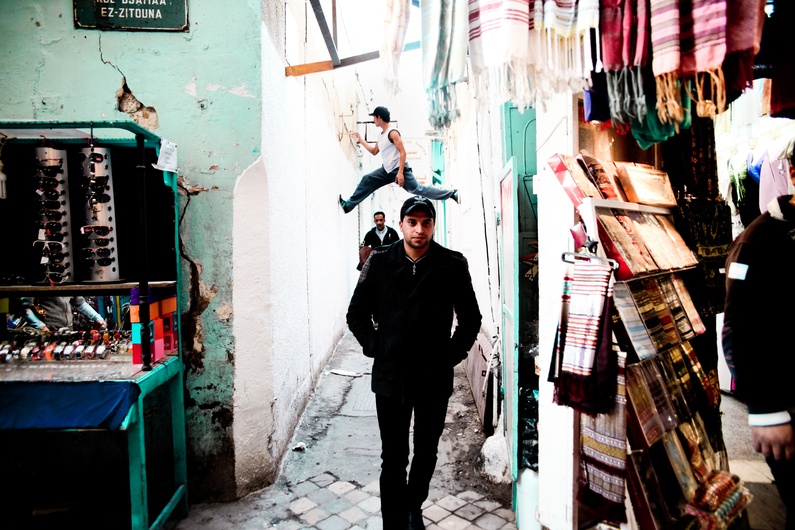 Shàrlém Màrwin tames the narrow streets of the Medina, the historic centre of Tunis. "Some young people do parkour for the pleasure of it, to get rid of extra energy. Sometimes you find traçeurs (those who practise parkour - Ed.) in a bus station performing acrobatic moves, or flows, on things around them to pass the time. It often becomes a show for passers-by. It's better than standing still, waiting."
Shàrlém Màrwin tames the narrow streets of the Medina, the historic centre of Tunis. "Some young people do parkour for the pleasure of it, to get rid of extra energy. Sometimes you find traçeurs (those who practise parkour - Ed.) in a bus station performing acrobatic moves, or flows, on things around them to pass the time. It often becomes a show for passers-by. It's better than standing still, waiting."
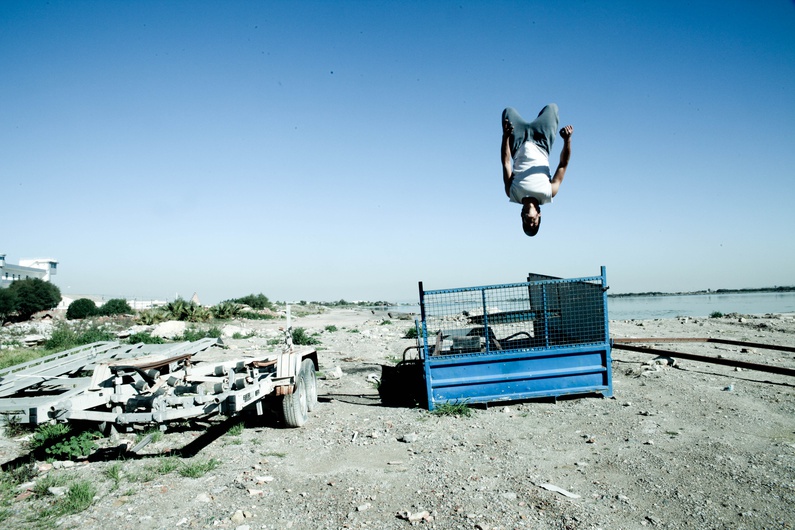 A few minutes away from the place du 14 janvier, wastelands stretch out along the Lake of Tunis.
A few minutes away from the place du 14 janvier, wastelands stretch out along the Lake of Tunis.
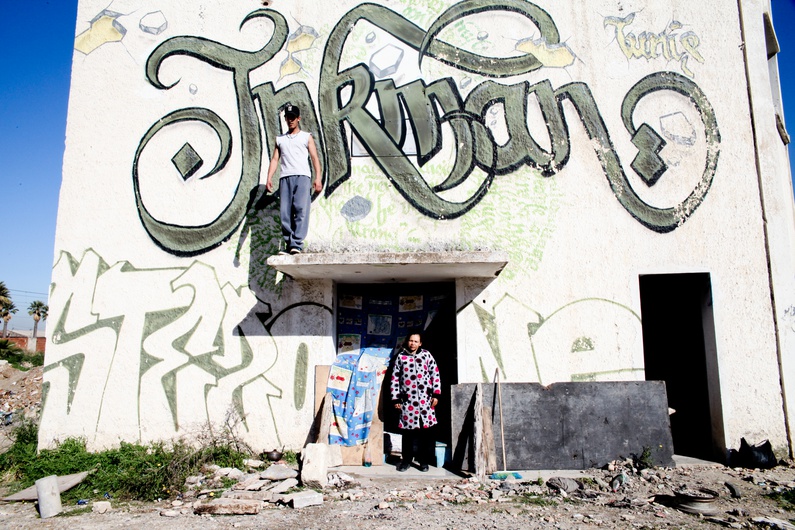 Young parkour practitioners and homeless people often end up spending the day together.
Young parkour practitioners and homeless people often end up spending the day together.
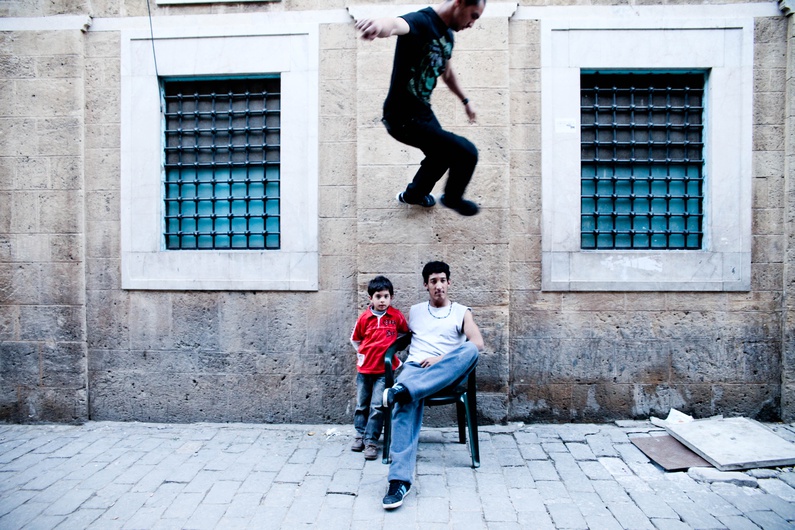 Tunis's Medina. "Parkour also lets you build a kind of balance between the human body and thought. Perfecting your inner ear, which is where the body gets its balance from. But it's difficult to achieve, and you need a few years' experience before you can truly find a balance."
Tunis's Medina. "Parkour also lets you build a kind of balance between the human body and thought. Perfecting your inner ear, which is where the body gets its balance from. But it's difficult to achieve, and you need a few years' experience before you can truly find a balance."
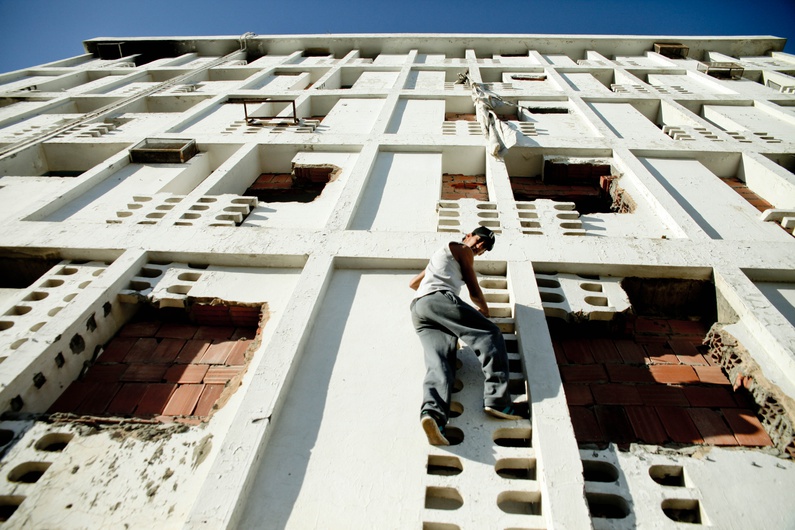 Disused building along route 22 on the outskirts of Tunis.
Disused building along route 22 on the outskirts of Tunis.
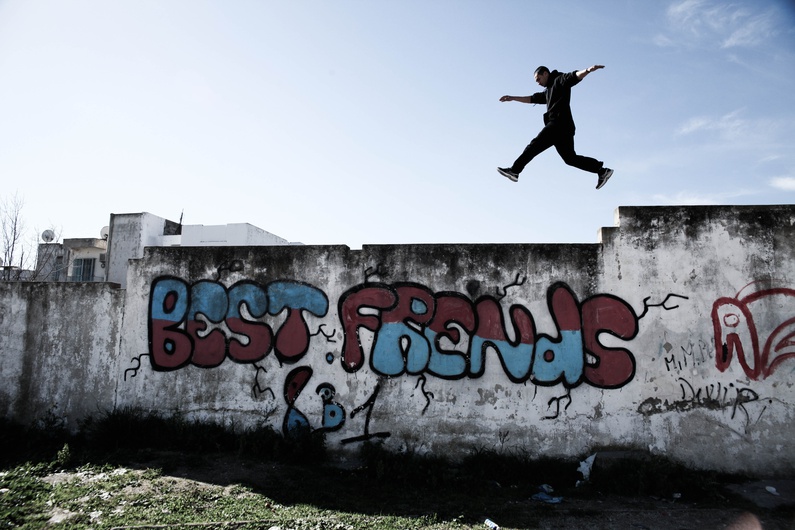 The New Medina, near the football pitch where young people from the area like to meet up after school.
The New Medina, near the football pitch where young people from the area like to meet up after school.
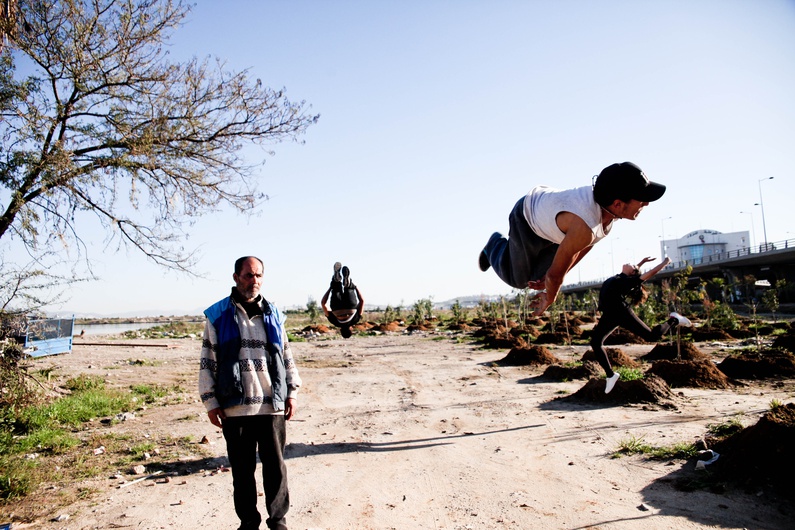 A homeless man watches the training. Many homeless people, formerly hidden from view by the Ben Ali government, now live right in the heart of the Tunisian capital, in disturbing human misery.
A homeless man watches the training. Many homeless people, formerly hidden from view by the Ben Ali government, now live right in the heart of the Tunisian capital, in disturbing human misery.
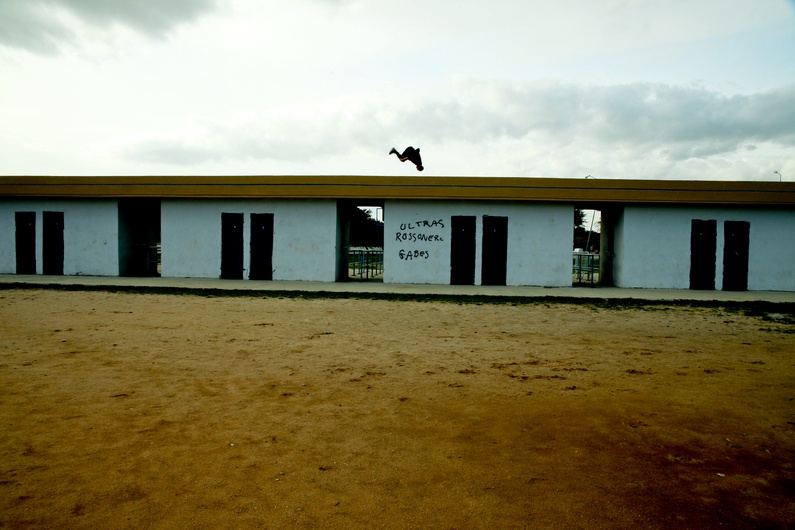 The area around the Radès Olympic Stadium, about seven miles from the city centre, is the perfect training space. "Parkour? It's not just a sport, it's a lifestyle," Hichem concludes.
The area around the Radès Olympic Stadium, about seven miles from the city centre, is the perfect training space. "Parkour? It's not just a sport, it's a lifestyle," Hichem concludes.
This article is part of the Euromed Reporter project, conducted in partnership with I WATCH and Search For Commong Ground and supported by the Foundation Anna Lindh.

Translated from Tunisie : Parkour, toujours



